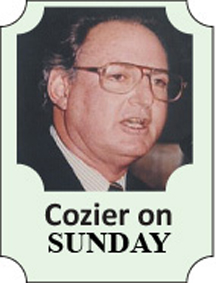THE prolonged civil war, what former Jamaica prime minister P.J.Patterson refers to as “this internecine warfare”, is at an end. Peace has broken out in West Indies cricket.
The warring factions, both under new leadership, have agreed to a cease fire after the better part of 20 years of furious infighting. Finally, the West Indies Cricket Board (WICB) and the West Indies Players Association (WIPA) have recognized that their constant confrontations was one of the principal reasons for the deterioration of a game it is ostensibly their responsibility to protect.
Over the past couple of years, Dave Cameron has become the WICB president and Michael Muirhead its chief executive, succeeding Sir Julian Hunte and Ernest Hilaire; Wavell Hinds has taken over as WIPA’s chief everything, replacing his former Test teammate Dinanath Ramnarine.
All three are Jamaicans. It makes a difference.
The hostilities were at their most damaging during the conflicts between Hilaire and Ramnarine, two strong-headed individuals. Hilaire has moved on to a diplomatic posting for the St.Lucia government in 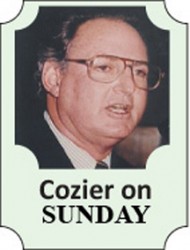 London, Ramnarine to less stressful pastures in Trinidad.
London, Ramnarine to less stressful pastures in Trinidad.
Those who have taken their positions are less militant, more conciliatory.
Patterson, head of the committee whose commissioned report in 2007 recommended changes to the structure of the WICB, was guest speaker at the annual players’ awards in Kingston on June 6, a joint undertaking by the WICB and the WIPA.
“Thankfully, this strained relationship seems to be a thing of the past,” he said. It is optimism supported by strong evidence.
Hinds made no public hue and cry over the pressure placed on the players by the shambolic scheduling of the back-to-back tours of India and New Zealand last year.
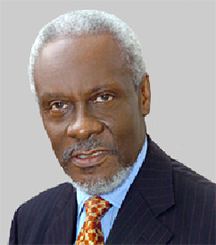
When Sunil Narine delayed his return to the team camp prior to the current New Zealand series in order to turn out for the Kolkata Knight Riders in the IPL final, Trinidad and Tobago’s sports minister Anil Roberts made a strident case for the decision to be overturned. Hinds simply noted that all the players were aware of the WICB’s rule.
It is not that Hinds and the WIPA won’t pursue issues that affect their members; it is just that Hinds appreciates that there is nothing to be gained from washing dirty uniforms in public.
There are other unmistakable signs of change.
Lawsuits that characterized the previous relationship have vanished. Chris Gayle, Jerome Taylor and Sulieman Benn are back in the team after long periods of exile, triggered by problems with the WICB.
There hasn’t been so much as a hint of the strikes, actual or threatened, that decimated several West Indies teams and put player against player.
The transformation has been most obvious in the renewed involvement of the great players of the past who for so long had felt alienated by the board.
Viv Richards was on the sidelines since he was dismissed as coach following the ill-starred tour of New Zealand in 2000-01 and as selector in 2003 after the WIPA alleged that he and others on the panel
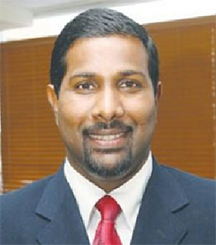
“verbally belittled and threatened” some of its players in public.
He returned as he was placed in charge of the WICB’s High Performance Centre (HPC) team for the series against Bangladesh ‘A’ in Barbados in May. It won the first four-day match by 351 runs, were one wicket away from victory in the second before making it 3-0 in the 50-overs version. Kraigg Brathwaite, the 21-year-old opener, specifically referred to Richards’ influence at the HPC in expanding his range of strokes; his next three of four innings were 164 against the Bangladeshis, 129 and 68 in the Tests against New Zealand. If Jermaine Blackwood, 22, needed no encouragement from anyone to play his shots he listened carefully to Richards’ advice on making it count. He reeled off 140 and 147 against Bangladesh ‘A’’ before hoisting his seventh ball straight for six off Trent Boult on his way to 63 on his resulting Test debut against New Zealand.
Curtly Ambrose, the enforcer during Richards’ tenure as captain, was initially bowling coach to the HPC and combined universities’ team. He was promoted to the West Indies’ job for the current series against New Zealand.
His rallying orations in the huddle prior to the team taking the field epitomise his infectious enthusiasm. On their comebacks, Taylor and Kemar Roach have clearly benefited from his input and that of head coach Ottis Gibson.
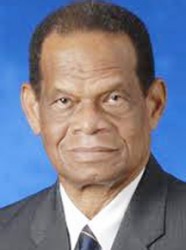
After his 103 in the second Test ended something of a run drought, Darren Bravo spoke of the effect of the wisdom passed on before the match by Garry Sobers and his celebrated cousin, Brian Lara; there are no better tutors for a left-handed strokemaker.
There is certainly a transformation from the days when some damaging disagreements were never far away.
They led to the players’ standoff at a hotel at London’s Heathrow airport prior to the first major tour of South Africa in 1998-99 and strikes in 2005 and 2009.
There was the disruption of the domestic first-class tournament in 2003 that then WICB president Wes Hall called “the darkest day ever in West Indies cricket”.
Repeated court actions against each other resulted in arbitrations that usually went in favour of the WIPA, to Ramnarine’s obvious delight.
The WICB’s actions and Hilaire’s censure of supposedly difficult players sidelined Gayle and Taylor and earned Ramnaresh Sarwan a sizeable payout for damages.
The alienation of greats of the past were just a sampling of the disruptive issues. More times than was good for the sport, prime ministers intervened to save more embarrassment.
Five years ago, Trinidad and Tobago boycotted the WICB’s annual general meeting. It contended that the WICB was not functioning effectively and warned that if it was not “properly restructured”, it would have “no choice of playing as an individual territory on the international scene”. Ramnarine once charged that his organization was “facing a tyrannical and despotic WICB that has suspended its discretion, jettisoned all reasoning and is hell bent at all costs to do the bidding of its sponsor”.
The WICB accused him of physically attacking Hilaire at one meeting in Kingston and refused to have any further dealings with him.
Yes, it was as bad as that.
